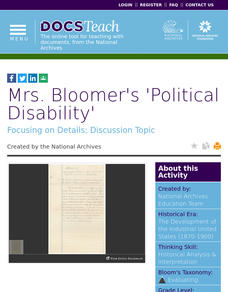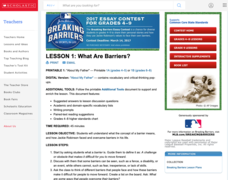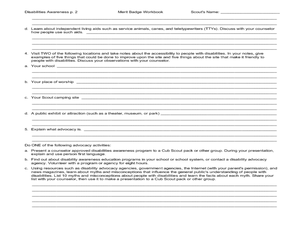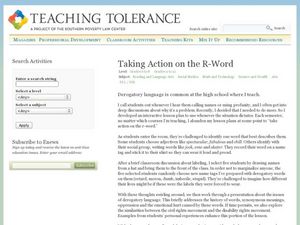DocsTeach
Mrs. Bloomer's 'Political Disability'
It's hard to believe that women had to argue for the right to vote a mere 100 years ago. Today, young historians can examine their case left behind in primary sources. Using a letter from a woman who claimed she should be able to vote...
NYC Department of Records
Citizenship and Elections: The Importance of a Ballot
Approximately 58 prcent of those eligible voted in the 2016 US Presidential election. In an attempt to impress upon learners the importance of voting and voting rights, class members examine primary source documents related to the...
California Academy of Science
Kinesthetic Astronomy: The Meaning of a Year
How many times have you traveled around the sun? Aspiring astronomers grasp what a year is and they differentiate between orbit and rotation by walking around the sun right within your classroom. Place a lamp in the center of the room to...
Scholastic
Lesson 1: What Are Barriers?
Scholars discuss the concept of a barrier with a short passage on Jackie Robinson. The writing process begins with a paragraph and several other sentences about Robinson's unique traits that made breaking a barrier possible.
Curated OER
Stonewall and Beyond:
Pupils examine issues that surround the quest for gay/lesbian equal rights, explore bias and negative stereotyping in the media and their effect on how gays and lesbians are treated, examine their own biases, and express their opinions...
Curated OER
Compliments can Change the World
Students explore the definition of philanthropy as it relates to bullying. In this moral values lesson, students listen to the book Thank you, Mr. Falker and identify how the main character was bullied. Students define philanthropy, and...
Broward County Schools
Women's Contributions to the United States
Betsy Ross, Toni Morrison, Sacajawea, Amelia Earhart, Maya Lin, Sally Ride, Judy Baca. No matter the subject area or the grade level you teach you will find much to value in a manual that focuses on the contributions U.S. women have...
Curated OER
What was life like for African Americans after the Reconstruction?
Young scholars examine the origins and effects of Jim Crow laws and how specific legislation supported segregation. The lesson provides foundational, historical background for unit on the media's role in the social justice campaign of...
Curated OER
Boy Scout Merit Badge: Disabilities Awareness
In this boy scout merit badge: disabilities awareness learning exercise, 8th graders research the topic using the websites listed, answer 7 detailed questions about access, agencies, disabled people, careers, advocacy then perform...
Curated OER
Teaching Tolerance: Taking Action on the R-Word
Students explore the use of derogatory language and labeling others. In this discrimination instructional activity students research word origins, how different terms came to be used in a negative sense and what it would be like to have...
PACER Center
The Peer Advocacy Guide
Teasing, mocking, and disrespect can be the hallmarks in the life of those with disabilities. Disrupt the cycle of abuse with a toolkit designed to turn peers into advocates for all those who are bullied. Everything needed to create a...
Curated OER
Immigration in the United States
Students explore how recent immigration and migration patterns impact social and political issues. They apply affective learning techniques
Curated OER
Parallel Studies of the Afro-American and Puerto Rican Experience in America
Pupils compare/contrast the Afro-American and Puerto Rican experience as they migrated and assimilated in the U.S. They research and discuss the reasons for migration and the historical significance of economic autonomy and oppression.














